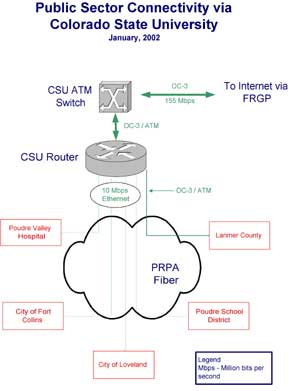The Fort Collins Community Network (FCCN) is an unincorporated association of public-sector entities in northern Colorado that participate in collaborative networking. The goals of the activity include:
- By sharing, participants enjoy higher-speed, higher-quality networking
- Economies of scale result in lower costs for networking
- Participants experience greater performance for traffic among themselves
- Participants experience greater performance for traffic to and from private sector entities that peer with the FCCN
- Shared technical expertise results via the Greatest Common Denominator of the technical staff of the participants
Access to the Internet for the FCCN is provided by the Front Range GigaPoP (FRGP) in Denver. The FRGP is multi-homed to three Internet1 providers, and also provides access to the next generation, high-speed Internet2 network for K-20 sites. Local access is obtained over fiber that may be leased from the City of Fort Collins or Platte River Power Authority.
The FCCN is not an Internet Service Provider (ISP) as it does not provide typical ISP functions, such as email, domain name service, IP addresses, etc. Rather, it is a group that simply shares networking access.
Philosophy
The philosophy of the activity is high-quality, low-cost services, with a minimum of administrative overhead. Indeed, this is why the activity is not incorporated, and why it operates informally.
Participants
Participants include Colorado State University, the Cities of Fort Collins and Loveland, Front Range Community College, Larimer County, Platte River Power Authority, Poudre School District, Liberty Common Schools, UC Health (Poudre Valley Hospital and Medical Center of the Rockies).
Administrative contacts for the above serve on a de facto Steering Committee, and govern the FCCN by majority vote. Typically, votes are unanimous.
The technical lead on the effort is Angie Asmus at Colorado State University.
Network Architecture

Cost Sharing
Participants pay one-time costs and recurring costs. One-time costs consist of paying for the port on the router to which the site connects, and for the equipment on the ends of the fiber used to transport 10 Mbps Ethernet. Recurring costs for each site include the cost of leasing the fiber from the site to the hub at Colorado State University. Recurring shared costs are partitioned each month according to Internet capacity. All participants, except CSU, share a Permanent Virtual Circuit (PVC) to the FRGP. Each month, the FRGP bills Colorado State University for costs associated with the PVC. These costs are partitioned, with no overhead or administrative fee added, among the sites sharing that PVC added to the costs of the circuit to the FRGP and the total costs are according to their measured Internet usage during the month. Although the costs are not constant, they “float” as does a site’s usage and as do the FRGP’s costs, this algorithm yields very low costs for all participants.
Peering
Peering is establishing a routing “short circuit” between sites that provides better performance and lowers costs by keeping local traffic local. The FCCN will peer with any major private sector networking provider under the following conditions:
- The provider must have sufficient technical expertise to engage in BGP4 routing
- The provider must provide and pay for its own transport to the FCCN
- The FCCN will provide, free of charge to the provider, a port on its router, and manage the provider’s connection to the FCCN
- The provider must enter into a legal agreement with Colorado State University specifying the terms and conditions for the connection.
Sites interested in peering with the FCCN should contact Angie Asmus.